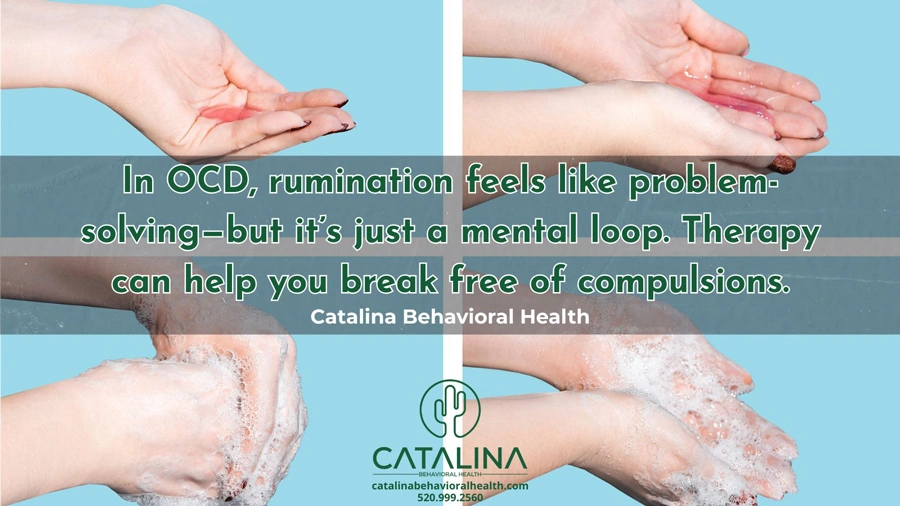Find Help for Obsessive Compulsive Disorder Symptoms at Catalina
Do you struggle with rumination? OCD? Intrusive thoughts? The recurring negative thought patterns and the repetitive behaviors they lead to can be incredibly disruptive to daily life. People with OCD often find themselves struggling to break free from the cycle without the help of a licensed therapist.
At Catalina Behavioral Health, a Joint Commission-accredited treatment center in Tucson, we’ve treated a range of OCD behaviors. While some have come to us with mild OCD, others have had extreme obsessive thoughts constantly feeding their compulsive behaviors.
We use a variety of evidence-based treatments to interrupt the unhelpful patterns of ruminations and intrusive thoughts OCD often brings with it, providing lasting relief for clients.
Please continue reading if you or a loved one is stuck in a rut of obsessive thinking and mental compulsions. We’ll discuss rumination, the negative emotions and thoughts that feed the cycle, and obsessive-compulsive disorder treatments that work.
Get Confidential Trauma and OCD Assessment – Call Now!
What Are Intrusive Thoughts in OCD?
Intrusive thoughts are repeated, unwanted thoughts, images, or urges that enter someone’s mind and start the vicious cycle of OCD. The thought process may feel disturbing or inappropriate, even when someone doesn’t want to act on a particular thought.
These are not just random worries or harmless concerns. These are obsessions that lead to intense anxiety and ultimately become compulsive behaviors in an unhealthy, causal relationship. Replaying the OCD symptoms over and over again can leave someone feeling ashamed, fearful, or emotionally exhausted.
Effective OCD treatment programs such as our accredited offerings at Catalina provide relief.
Connecting Ruminations and Obsessive-Compulsive Disorder

Ruminations and obsessive thoughts can both be repetitive and distressing thought patterns. But, although closely related to one another, they are not the same thing. Rumination is an emotional spiral without seeking relief. OCD obsessions trigger the need to engage in a compulsion to feel safe or in control.
In excessive rumination, someone may dwell on an anxiety-inducing topic, such as a perceived failure or “what if” scenario. However, the person doesn’t necessarily seek temporary relief from the thought through compulsive behavior.
Conversely, OCD’s intrusive thoughts, more accurately called obsessive thoughts, usually find relief by acting on compulsions. Compulsive behaviors can include mental rituals or physical behaviors that reduce the anxiety associated with the thought process.
Compulsive Rumination (OCD)
In OCD treatment terms, compulsive rumination refers to repetitive thinking, mental compulsions like problem-solving, or overthinking. It can feel like the internal process is impossible to stop, even though it never reaches any helpful conclusion.
Unlike everyday rumination that helps us reflect and see how we can do things better in the future, ruminating thoughts often arise from anxiety disorders. It may focus on moral dilemmas or disturbing thoughts.
This constant rumination can greatly disturb a person’s life and may require therapy from a mental health professional to stop.
Mental Compulsions in OCD
Mental compulsions are repetitive thought processes or mental activities that a person with OCD engages in to try to ease or “fix” their intrusive, often negative thoughts. They differ from visible behaviors like checking the clock or handwashing. Mental compulsions happen quietly. They can include counting, reviewing or replaying a past scenario, or reciting prayers or mantras.
Some with psychiatric disorders like OCD or anxiety believe they can prevent a bad future event from happening by completing these behaviors and suffer tremendous stress if they cannot. They may spend a considerable amount of time on these obsessions.
The Differences Between OCD and Abnormal Intrusions

Everyone has random, spontaneous thoughts called abnormal intrusions on occasion. They’re a regular part of brain activity. Most people can brush away these everyday intrusive thoughts by deep breathing a few times or taking a long stretch to relieve stress and quickly come back to the present moment. Most can stop ruminating with little effort.
But for people with mental health conditions like OCD, the same thought can become part of a negative thought pattern. They become highly distressing thoughts that heighten feelings of anxiety. The difference is the emotional reaction to the intrusive thought and the physical or mental obsessive-compulsive symptoms that follow.
OCD’s Impact as a Long-Term Mental Health Condition
Obsessive-compulsive disorder is a chronic mental health condition. Over time, OCD symptoms can impair daily functioning, destroy relationships, and harm one’s overall wellness.
OCD appears to come from genetic abnormalities in brain structure and function in the obitofrontal cortex, basal ganglia, and anterior cingulate cortex. These regions regulate decision-making, impulse control, and emotions, which at least partially explain what triggers the intrusive thoughts.
Generalized anxiety disorder and depressive disorder symptoms often co-occur with OCD. Some start self-soothing these mental disorders through poor coping mechanisms: drug or alcohol use, inappropriate sexual activities, or developing other compulsions.
Get Accredited Treatment Programs at Catalina
Themes of OCD-Related Intrusive Thoughts
Some people with OCD have recurring themes, causing emotional distress, even when people ruminate on things that have never happened. They may try to resist these intrusive thoughts, but they can’t stop them. Some of the frequent themes are these:
- Thoughts of Harm or Negative Experiences: Some feel distress caused by unlikely visions of harm to themselves or family members. For example, “What if I (or a loved one) trips in front of oncoming traffic?” That event has probably never happened to the person, nor is it likely to ever occur. While the scenario sounds far-fetched, the distress is very real to those experiencing rumination OCD.
- Contamination Fears: Some have excessive fear about germs, an everyday external factor that’s nearly impossible to control. They avoid going out in public, excessively sanitize surfaces, or wash their hands many times a day.
- Morality Themes: Some develop intrusive thoughts about sinning, offending God, or not being enough. It leads to obsessions about prayer and morals, going far beyond the typical beliefs of all mainstream religious practices.
- Relationship Anxiety: OCD may lead to extreme anxiety or ruminating thoughts about their relationships. Their intrusive thoughts put doubts in their minds, causing troubling obsessions like following their partner or tracking their phone.
- Sexual Thoughts: OCD rumination can lead to thoughts of taboo or disturbing sexual scenarios that go against the person’s values. While they usually don’t act on them, they may feel physically “dirty” and shower. Others perform mental checking to test their thoughts or avoid loved ones or friends out of fear or shame.
- Perfectionism: Those who constantly move things around or try to make things “just so” and symmetrical may have a fixation on perfectionism. They may believe that something out of place will cause a bad outcome.
- Guilt and Responsibility: Sometimes, the ruminating thoughts revolve around someone forgetting to do an important tasks, thus accidentally causing harm to someone else. This can lead to obsessions including checking door locks.
Acting on the intrusive thoughts is the key symptom that separates OCD from other mental health disorders.
Why Avoidance Doesn’t Work with OCD

Avoiding triggers may sound like a good solution for OCD rumination, but it actually makes matters much worse. When someone avoids problem solving altogether and skips out on the people and places that trigger OCD rumination, they miss out on an important opportunity to see that their fears are almost always unfounded. They also miss a chance to see how they can tolerate the discomfort of not acting out their compulsions.
Instead of reducing anxiety associated with OCD rumination, avoiding it reinforces the belief that the thought is dangerous. That keeps the brain stuck in a harmful cycle of fears and obsessions.
Once this happens, it requires a mental health professional to help retrain the brain to reduce rumination and fear so that the person can resist the urge to engage in the compulsive rituals.
Sofia Had Compulsive Behaviors and the Urge to Act on Intrusions
Before she came to Catalina Behavioral Health, ‘Sofia’ struggled with disturbing thoughts that reached beyond her control. She constantly thought about accidentally making loved ones sick by touching contaminated surfaces. She thought she could stop ruminating thoughts by washing her hands repeatedly, but that only made things worse. Her symptoms and obsessions over cleanliness eclipsed her entire life.
Sofia came to Catalina exhausted from the obsessions but eager to make life-altering changes. Her counselors created a customized program to help her ease her symptoms and support her in recovery.
Through specialized therapies, Sofia learned to sit quietly and allow her anxiety from the obsessions to float past instead of giving in to them. One visualization technique taught her how she could lie down quietly, picturing her obsessive thoughts as clouds that would slowly drift away; this imagery helped her avoid acting on the compulsions.
She also received a prescription that helped her stop ruminating before it turned obsessive. With a lot of hard work, Sofia started breaking through and ignoring her obsessive-compulsive symptoms.
After therapy, Sofia found peace and more emotional freedom. The thought patterns have not quite disappeared. Still, she now lives a much more successful lie without let her fears about germs control every waking moment of her day. Sofia now has the tools to face challenges and live a peaceful life.
When OCD is Misdiagnosed: Anxiety Disorder or Something Else?
OCD is an often-missed diagnosis, frequently confused with generalized anxiety or depression. Its symptoms might be somewhat similar on a surface level.
However, OCD is an entirely separate diagnosis that involves the obsessions and compulsive behaviors that we’ve been discussing. The missed diagnosis can lead to the wrong treatment and worsening symptoms.
Accurate diagnosis is necessary, helping treatment professionals find the right approach to calm OCD ruminations.
Catalina Behavioral Health’s Treatment Approaches for OCD

Behavior research continues to discover new treatments for OCD. The National Institutes of Health (NIH) supports ongoing studies that it hopes will help better understand the underlying causes. The goal of the research is developing new treatments.
Until then, our team relies on evidence-based therapies and FDA-approved selective serotonin reuptake inhibitors (SSRIs) to manage the symptoms of obsessive rumination.
Exposure and Response Prevention (ERP) Therapy
According to the International OCD Foundation, exposure and response prevention therapy is considered the “gold standard treatment” for treating OCD symptoms.
With response prevention/ERP, clients have gradual exposure to the thoughts or images that trigger anxiety and obsessions. They also learn to resist the urge to act on their typical compulsions.
With practice, clients teach their brains that anxious thoughts can fade away without compulsive behaviors.
Cognitive Behavioral Therapy (CBT)
Cognitive behavioral therapy is a well-known talk therapy that helps clients recognize negative thought patterns and unhelpful behaviors, like compulsions. Once clients have used CBT to identify how their OCD rumination occurs, they can challenge those processes to make positive changes and stop the obsessive-compulsive behaviors.
Up To 100% of Rehab Costs Covered By Insurance
Call Catalina for Obsessive Compulsive Disorder (OCD) Help
The Catalina Behavioral Health team is here to help you stop your OCD rumination thoughts and behaviors. With our expert team at your side, you will gain the coping tools that help you identify the thoughts as they occur, examine them, and dismiss them before you act upon them.
We provide a safe, supportive environment, recognizing that OCD is a disease; it is not a choice you’ve made. Our team of professionals will treat you with dignity and respect. From the admissions staff who will review your insurance policy and ensure you receive maximum benefits to the clinical team, every person is here to support you.
Call us today – we’re here to help you start the healing process.





